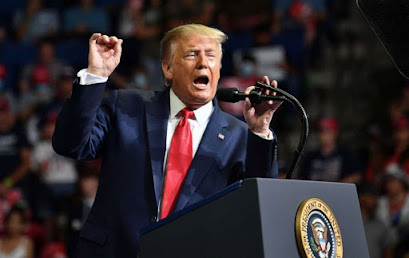The Culpability of the Chinese Government
It is my persuasion that China, under its current communist system of governance, is a renegade bad-faith actor along the lines of Iran, Venezuela, and North Korea. Rather than testing missiles, the government perpetuates an Orwellian surveillance state (to repress their citizenry, particularly the Uighurs) and economic warfare (which powers their efforts to unseat the United States as the world's predominant economy).
Meanwhile, the Chinese Communist Party protests insinuations they are culpable for the outbreak of the coronavirus, suggesting their own incompetence. Empirical evidence points me toward the former view -- the view that China is an Orwellian bad-faith actor. As Michael Auslin of National Review reports,
Meanwhile, the Chinese Communist Party protests insinuations they are culpable for the outbreak of the coronavirus, suggesting their own incompetence. Empirical evidence points me toward the former view -- the view that China is an Orwellian bad-faith actor. As Michael Auslin of National Review reports,
Chinese officials knew of the seriousness of the pandemic as early as December, yet waited weeks to begin restricting travel, allowing millions of Wuhan residents to visit relatives elsewhere in the country and abroad for Lunar New Year celebrations, spreading the virus as they went. British scientists have argued that if Beijing had acted just three weeks earlier, it could have reduced the spread of the virus by 95 percent. ...
We also know that in the time before the outbreak’s seriousness became apparent outside China, the CCP destroyed laboratory samples and punished the brave doctors and citizens who tried to warn their countrymen and the world about the pathogen, while refusing foreign offers of help. We are almost certain that Beijing dramatically underreported the number of deaths in Wuhan, and is no longer reporting new infections in China.
If a government obfuscates reality to the point where it not only affects their population but also the life, liberty, and property of U.S. citizens, the U.S. should not enter a partnership with that government. Making this principle reality would require China's expulsion from the WHO, U.N. chairmanships, international forums like the G-20, and perhaps even the U.N. Security Council. The latter suggestion is radical, but to make it clear that this is not an attack on the nation of China but instead the Chinese Communist Party, we could seat the government of the Republic of China (i.e., Taiwan) as the legitimate representative of the Chinese people.
It is becoming increasingly clear that our once-mutualistic relationship with the Chinese Communist Party, which commenced with Richard Nixon's visit to China in 1972, is becoming a predatory one in which the U.S. is the victim. The question is whether we want to perpetuate this new status quo or redefine global cooperation in a way that recognizes China as a bad-faith actor. At least from my vantage point, formally recognizing the true nature of the Chinese Communist Party is far more palatable than inaction.
It is becoming increasingly clear that our once-mutualistic relationship with the Chinese Communist Party, which commenced with Richard Nixon's visit to China in 1972, is becoming a predatory one in which the U.S. is the victim. The question is whether we want to perpetuate this new status quo or redefine global cooperation in a way that recognizes China as a bad-faith actor. At least from my vantage point, formally recognizing the true nature of the Chinese Communist Party is far more palatable than inaction.



Comments
Post a Comment